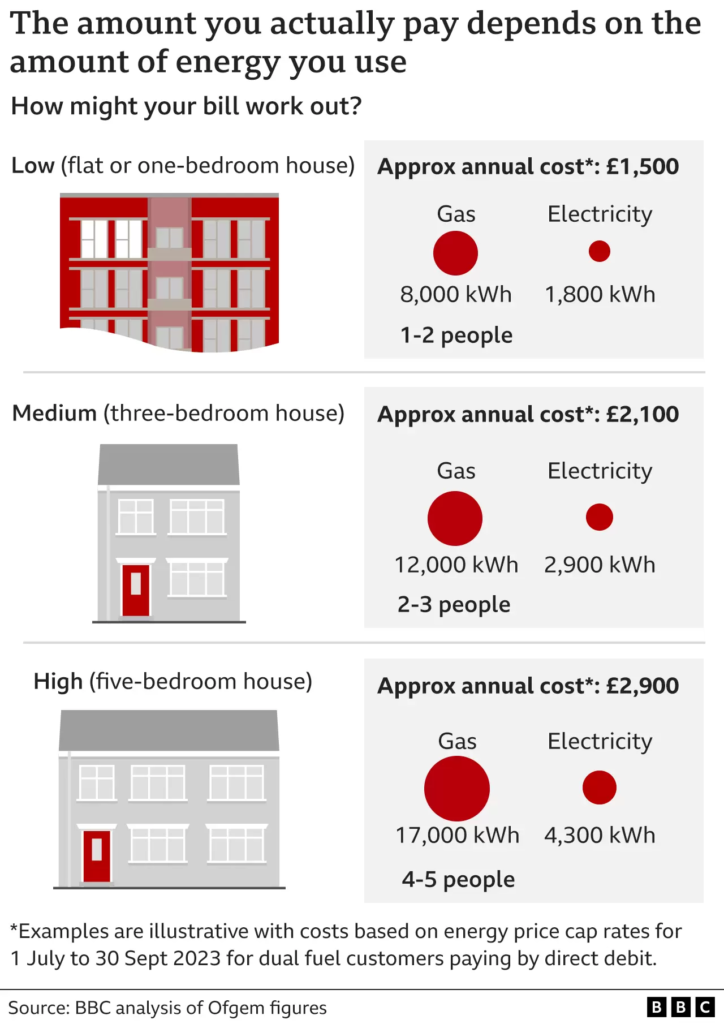
Audio By Carbonatix
Energy bills are set to remain high despite a cut in prices from July, experts have warned.
A typical household will pay £2,074 a year for gas and electricity from July, £426 a year less than currently, after the regulator cut the energy price cap for England, Scotland and Wales.
Government help in recent months has limited bills to £2,500.
However, prices are not expected to fall much further over the rest of the year and could edge up in winter.
MoneySavingExpert's Martin Lewis said that later on in 2023 bills would be similar to last winter because, although prices are cheaper, households will not get the same £400 discount from the government they previously received.
"People will still be paying double what they used to pay before the energy crisis hit," he added.
Kate Mulvany, from energy analysis firm Cornwall Insight, also said further substantial falls in bills would be unlikely particularly if there was a cold winter across Europe with the UK competing to buy energy with other countries.
"Our forecasts suggest until the end of this decade, higher and more volatile prices are going to be seen, and that includes the impact they're going to have on domestic bills unfortunately," she told the BBC's Today programme.
Earlier this week, Qatar's energy minister warned the "worst is yet to come" for gas shortages in Europe, suggesting prices could rise again.

There are hopes that the fall of the price cap below the government's guaranteed level could lead to the return of competition in the market, with people able to shop around for the best deal.
But Mr Lewis said that he did not expect to see firms publicising new offers immediately, with energy firms instead offering existing customers bespoke offers, with no new deals across the market.
The boss of energy regulator Ofgem Jonathan Brearley urged people to contact their supplier if they were struggling to pay their bill.
"In the medium term, we're unlikely to see prices return to the levels we saw before the energy crisis," he added.

Michael Houghton says the Emmaus charity in Ipswich helped him apply for grants to pay his soaring energy bill last winter.
He says his gas bill rose to almost £30 per week, forcing him to cut down on food shopping and entertainment.
But Mr Houghton says that prices remaining high is a concern in the long term. Without more support he worries he will not be able to afford to pay his energy bills if they remain at a similar price this coming winter.
Ofgem sets the maximum price that can be charged per unit of gas and electricity to households on variable or default tariffs in England, Wales and Scotland.
Since October, it has been superseded by the government's Energy Price Guarantee, which meant a typical household's annual gas and electricity bill has been £2,500, but this will expire at the end of June. A £400 discount on everyone's energy bills, provided by the government during the winter, came to an end in April.
Most households do not use a typical amount of gas and electricity. Bills are based on how much energy a household actually uses, which depends on the number of people, the type of property and its energy efficiency.
The calculations for a typical household are based on a direct debit customer using 12,000 kWh (kilowatt hours) of gas and 2,900 kWh of electricity a year. A kilowatt hour is a unit of energy used to calculate your bill.
Under the new cap the electricity unit rate is 30p per kWh, with a standing charge of 53p a day. The gas unit rate is 8p per kWh and the standing charge is 29p a day.

About 29 million households will be affected by the change in the cap, but there will be some differences in typical payments from July
- Those who pay via a prepayment meter will pay a similar level to those on direct debits at £2,077 a year
- Those who pay by cash, cheque or bank transfer, usually every three months, will have to pay more, with a price cap of £2,211 a year
- In Northern Ireland, which is regulated separately, bills will be held at £1,950 per year
Despite the cut to the price cap, charity National Energy Action said that 6.5 million people would still be in fuel poverty. The typical bill from July will still be much higher than in the winter of 2021 when it stood at £1,277 a year. Charity Citizens Advice described that as "unaffordable for millions of people".
And Simon Francis, coordinator of the End Fuel Poverty Coalition, said customers would still be paying roughly the same for their energy as last winter.
"And after months of inflation and the wider cost of living crisis, people are even less able to afford these high energy bills," he said.
Prime Minister Rishi Sunak said the cut to the price cap was a "major milestone" in the government's goal to halve inflation.
Inflation - the rate at which prices rise - has been running above 10% for several months, although it fell to 8.7% in April. One of the main factors pushing up the rate was the surge in energy prices following Russia's invasion of Ukraine.
However, Labour's shadow climate change secretary Ed Miliband said energy bills "remain eye-wateringly high, almost double what they were 18 months ago, and families and businesses across the country will continue to struggle to make ends meet".

Here are some energy saving ideas from environmental scientist Angela Terry, who set up One Home, a social enterprise that shares green, money-saving tips.
- Getting a water efficient shower head free of charge from your water company and using showers rather than baths
- Considering loft insulation, which she says costs around £460 for a typical semi-detached home and could save £355 a year on gas bills
- Hanging out washing instead of using a tumble dryer, and walk instead of drive when possible
- Use windy days to feel where draughts are in the house. Wetting the back of your hand helps to locate them, then use insulation or draught-proofing tape
- When available, press the smaller button to use less water to flush the toilet
Latest Stories
-
China’s BYD set to overtake Tesla as world’s top EV seller
1 second -
Joy FM’s iconic 90’s Jam returns tonight: Bigger, better, and packed with nostalgia
41 minutes -
Uproar as UG fees skyrocket by over 25% for 2025/2026 academic year
2 hours -
Japan PM joins fight for more female toilets in parliament
3 hours -
Ga Mantse declares war on fishing industry child labour
3 hours -
Adom FM’s ‘Strictly Highlife’ lights up La Palm with rhythm and nostalgia in unforgettable experience
4 hours -
OMCs slash fuel prices as cedi gains
5 hours -
Around 40 dead in Swiss ski resort bar fire, police say
6 hours -
AFCON 2025: Aubameyang and Nsue make history among oldest goalscorers
7 hours -
AFCON 2025: How Kwesi Appiah’s Sudan qualified for round of 16 without scoring any goal
8 hours -
Ghana is rising again – Mahama declares
8 hours -
Firefighters subdue blaze at Accra’s Tudu, officials warn of busy fire season ahead
9 hours -
Luv FM’s Family Party In The Park ends in grand style at Rattray park
9 hours -
Mahama targets digital schools, universal healthcare, and food self-sufficiency in 2026
9 hours -
Ghana’s global image boosted by our world-acclaimed reset agenda – Mahama
9 hours

